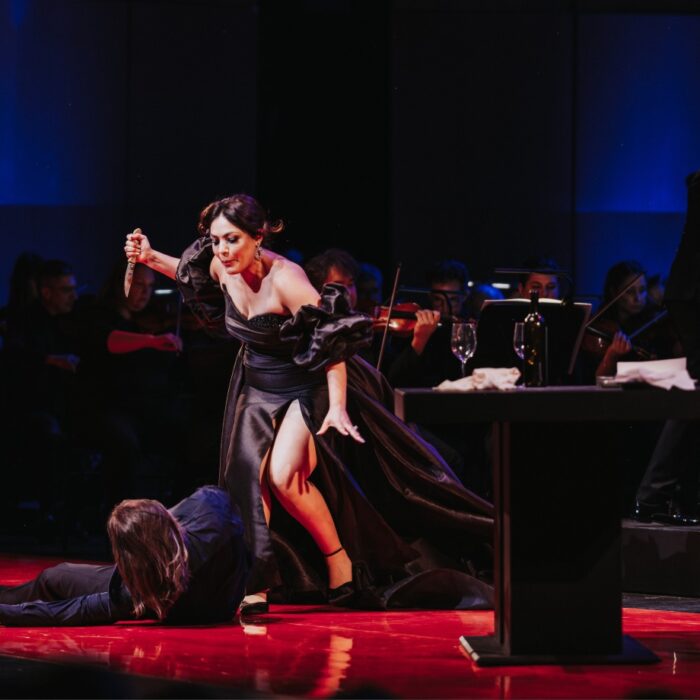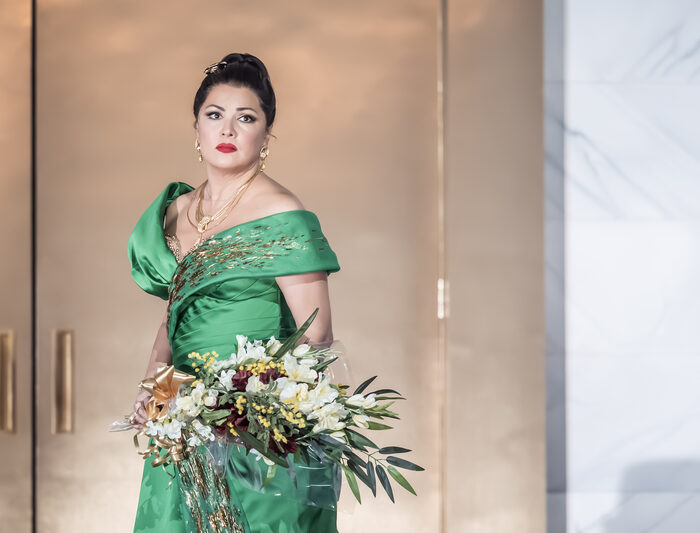![Scott Ramsay and Shana Blake Hill [Philicia Endelman]](https://operawire.com/wp-content/uploads/2019/12/Scott-Ramsay-and-Shana-Blake-Hill-Philicia-Endelman-300x200.jpg)
Numi Opera 2019 Review: Der Ring des Polykrates
By Gordon Williams(credit:Philicia Endelman)
For the second opera in their inaugural season, Los Angeles company Numi Opera presented Erich Wolfgang Korngold’s rarely-performed one-act comedy “Der Ring des Polykrates” at Zipper Hall at the Colburn School.
Numi Opera, formed by Gail R Gordon, is dedicated to works by composers whose voices have been silenced, in particular by Hitler whose rise in the 1930s resulted in many of those composers living in Los Angeles.
Korngold was by no means the most famous of the European composers who moved to the United States fleeing Nazism. That was, arguably, Schoenberg. But Korngold was probably the most successful of the composers whose careers began in the opera houses and concert halls of Central Europe and ended on the sound stages of Paramount or Warner Bros. Incidentally, Zipper Hall itself is named after Herbert Zipper, a later immigrant, who had started a secret orchestra in Dachau.
A Unique “Ring”
Korngold was a prodigy whose early work was praised by Richard Strauss and Sibelius. “Der Ring des Polykrates,” written when he was 17, was premiered by none other than Bruno Walter in Munich in 1916. Some might hear foreshadowing of the overblown scores of Errol Flynn swashbucklers, which Korngold later scored. I prefer to savor the fact that Hollywood movies of the 1930s preserved the rich musical language of Viennese post-Romanticism.
This is a most impressive score for a 17 year-old – replete with beautiful melodies (such as the charming duet “Glueck ist Mut”), strong vocal design, and sumptuous orchestration.
“Der Ring des Polykrates” is a delightful comic opera. Wilhelm Arndt (Scott Ramsay) has everything going for him, a new job (as Hofkapellmeister), a small inheritance, even a happy marriage. But he hasn’t seen his dear friend, Vogel (Roberto Perlas Gomez), for years. When Vogel appears, however, he is jealous of Wilhelm’s happiness and reminds him of Schiller’s tale of the ring of Polykrates – too much good fortune tempts fate: one should make a sacrifice.
So Wilhelm sparks a fight with his wife Laura (Shana Blake Hill) whose love turns out, on examination, to be too strong to admit of doubt. If a sacrifice should still be made, Wilhelm and Laura decide at the end of the opera, it should be Vogel himself who is shown the door.
Based on a parody of a 1797 Schiller poem by Leo Feld and the composer’s father, this production updated the setting to the 1950s. Updating really only consisted of wearing 1950s-style costumes as provided by Tanisa Fatchett Make Believe Inc, as this was a concert presentation.
Fantastic Musicianship
To a large extent, I was very glad. One of the most impressive attributes of young Korngold’s score is its orchestration. Celeste (played on this occasion by Numi Opera Music Director, Christopher Luthi) accompanies Laura’s diary aria wherein she double checks her past for any transgressions. A variety of percussion instruments add glitter.
It’s a small orchestra, no doubt, but in Korngold’s hands capable of enormous atmosphere and under conductor Francesco Milioto, the orchestra gave a strong and detailed interpretation. There was a great deal of beautiful playing, from the woodwinds and particularly from solo cello Armen Ksajikian.
“Der Ring des Polykrates” boasts a small cast – only five singers.
As Wilhelm and Laura, tenor Scott Ramsey and soprano Shana Blake Hill were an impressive pair, creating the impression of ideal Viennese operetta principals. The shape of Shana Blake Hill’s presentation of the aria mentioned above about her diary (“where I once recorded my dreams” in Linda Zoolalian’s effective supertitles) and the warmth of “Glueck ist Mut” as Wilhelm and Laura’s final duet were particularly effective, delivered with sincere quietude.
Comic relief was provided by tenor Alex Boyer as Florian and soprano Emily Rosenberg as his sweetheart Lieschen, both in the principals’ employ. There was much refreshing interplay in their repeat of their employers’ examination of marital fidelity – “der Schicksals Frage” (the fateful question).
Roberto Perlas Gomez was a suitably curmudgeonly old friend and there was a genuine chill in his voice when he mentioned having read Schiller’s poem about the need for a sacrifice while on the train to the Arndts’.
All the acting was quite impressive. Ramsey seemed authentically surprised when Vogel suggested that the sacrifice he should make should be to test his wife. And it was impossible not to look forward to Boyer’s every entrance. Even his informational recitative was delivered vividly, cleanly, humorously, and musically.
In sum, this was a most satisfying introduction to a work that is very rarely performed. It is this kind of unique experience that will always bring a smile to the face of a passionate opera lover.




